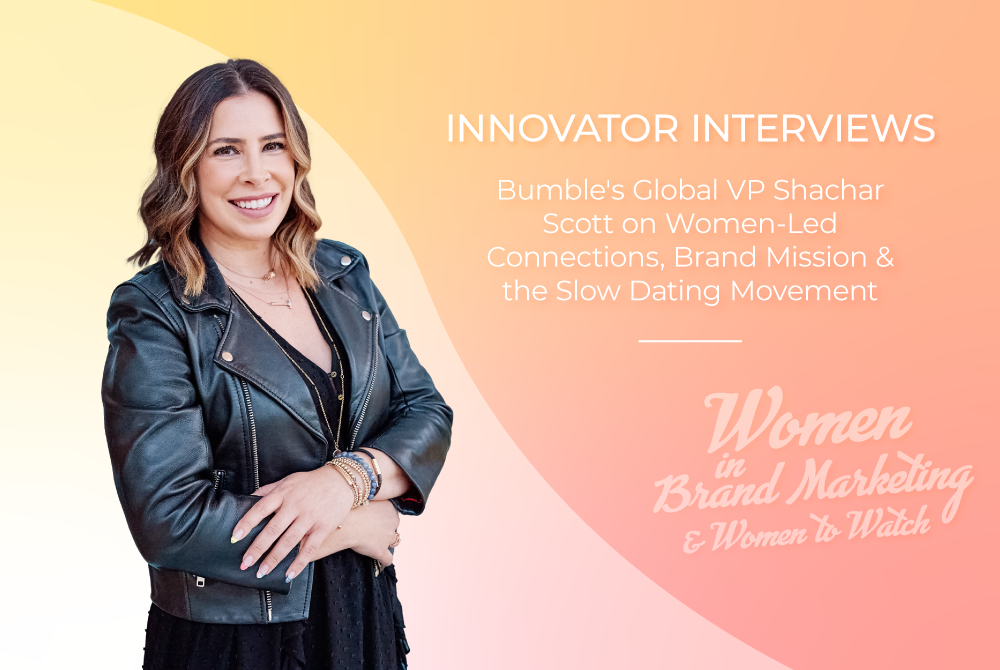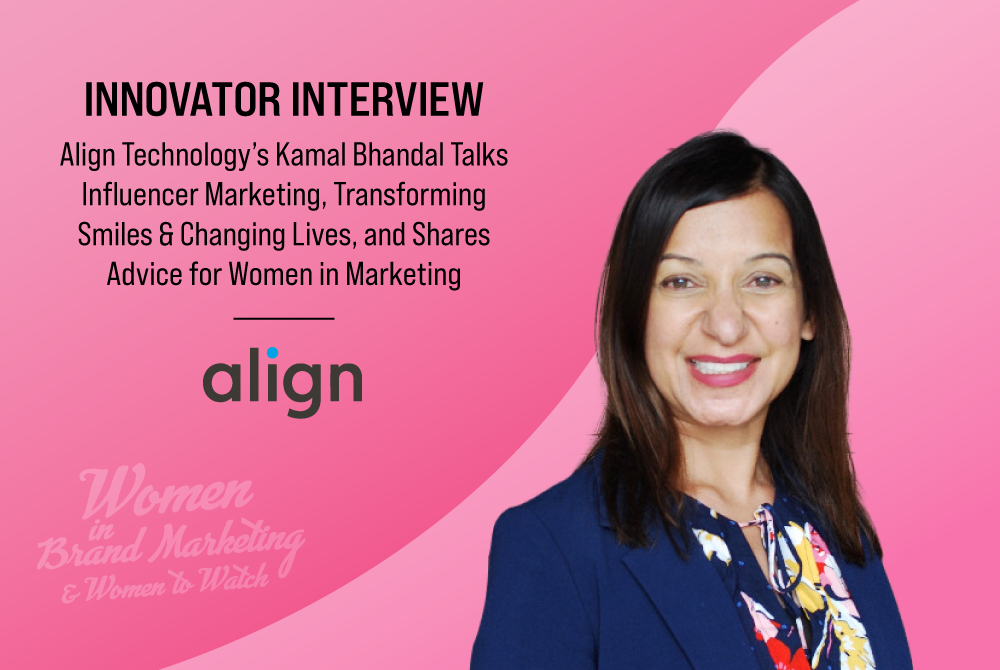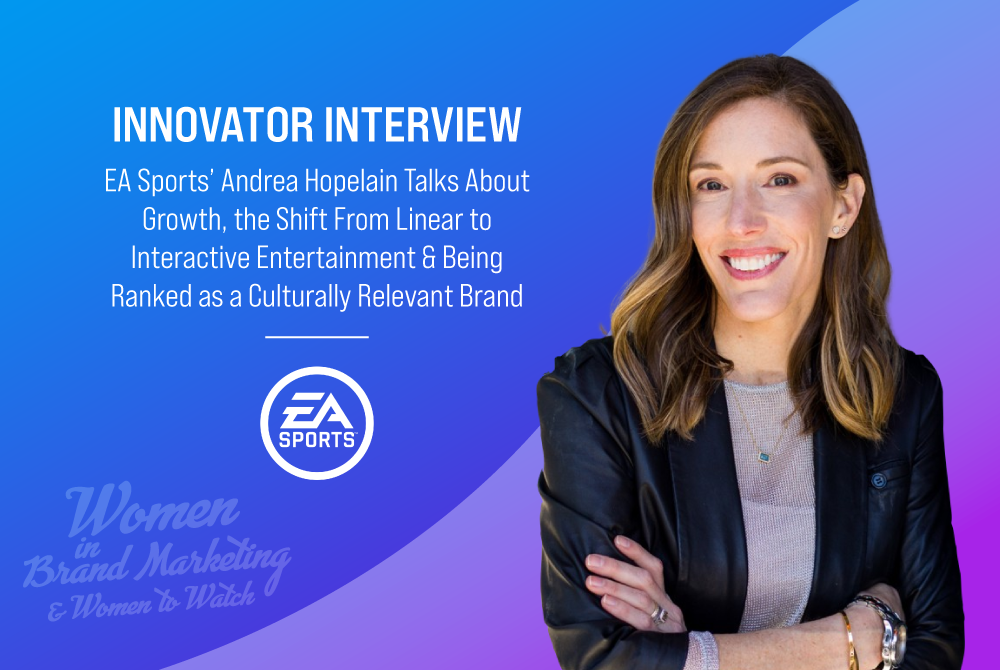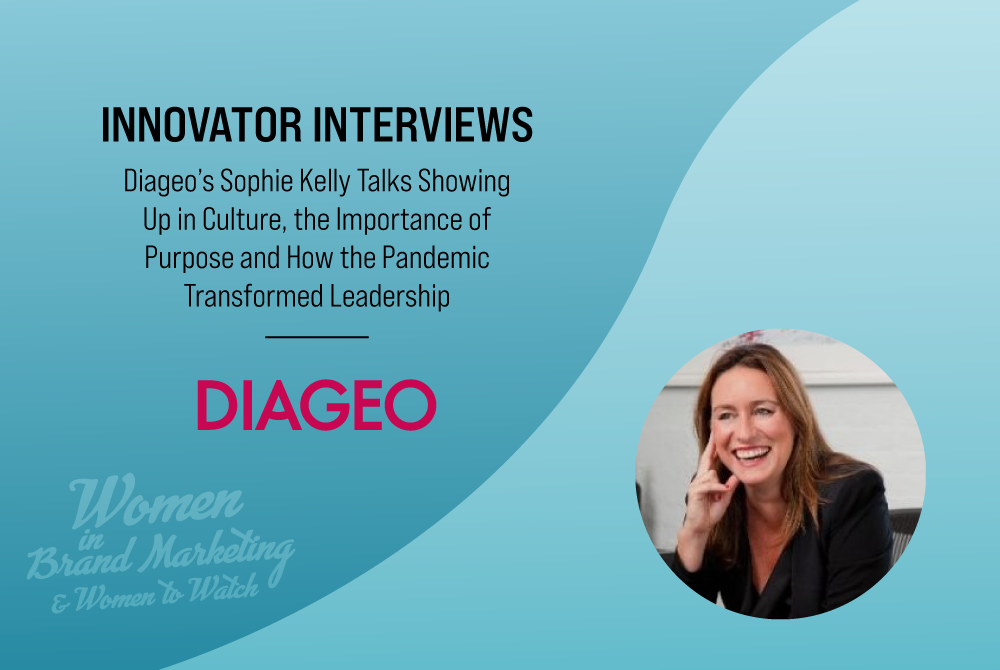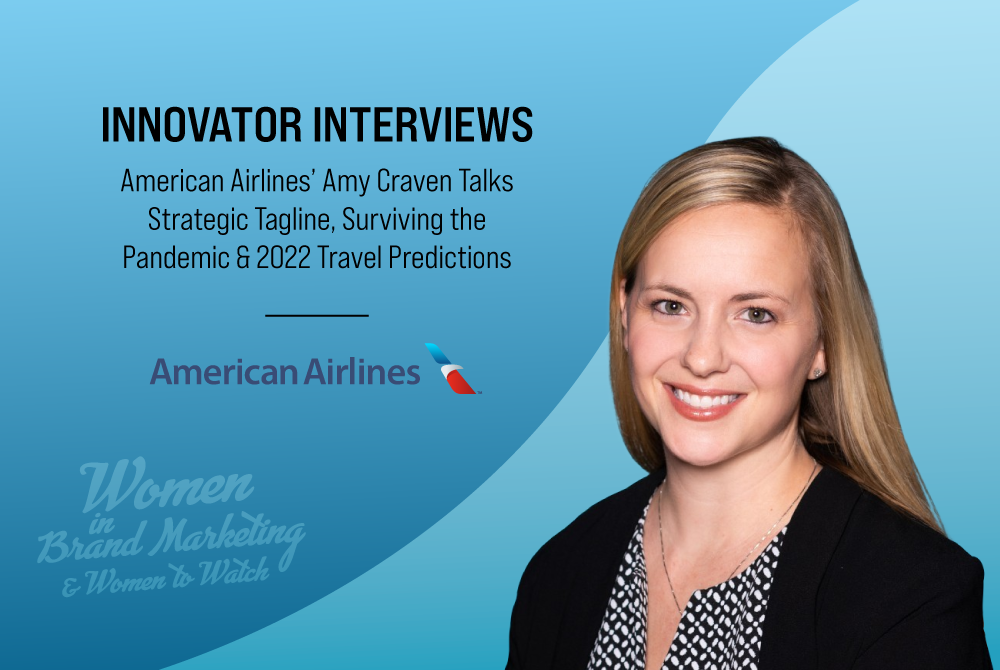Shachar Scott joined dating app Bumble as vice president of global marketing in December 2020, an exciting moment for the brand. Two months later, the company’s founder and CEO Whitney Wolfe Herd led the company through a $2.2 billion IPO, a move that would allow the company to continue its growth.
Since the IPO, the company has seen its revenues and user base grow, cementing its position in the dating app industry. Bumble differentiates itself in the dating app business by honing in on women. The app’s mission is to be the place where women can make the first move and create a safe space for developing healthy and equitable relationships. “The IPO just really allowed us to accelerate and also scale our mission,” says Scott.
Scott was recently named to Brand Innovators Women to Watch in Brand Marketing Class of 2021 list, an apropos placement for a woman who is trying to change the world of dating for women. As we head into 2022, she is very hopeful that next year will be the year of women.
“I think 2022 is the year of female empowerment,” says Scott. “After almost two years of having the opportunity to be so introspective and thoughtful about how we want to live our lives and who we choose to spend our time with, women, in particular, are just in a really incredible place. There is opportunity for them to feel empowered and encouraged to make the first move in other facets of their life, not just in dating. 2022 is the year of women empowerment and really allowing women to be in their aura, in their natural state.”
Scott caught up with Brand Innovators from her home in Los Angeles to talk about Bumble’s mission, how the app is working to make the Internet safer for women and how working at Apple and Snapchat prepared her for her current role. This interview has been edited for length and clarity.
Can you talk about Bumble’s brand pillars and how these foundations shape your approach to marketing?
What I love about the brand is that our mission and our product USP [unique selling position] are all inextricably linked. The differentiator on our platform is that it is women led. Women make the first move. They initiate contact and really take control of communication, really being intentional about what they are looking for and that is a brand pillar for us too. We are constantly sharing and amplifying the value of what happens when women make the first move and really showing the power and courage that it takes to do that but also the reward that comes along with it. A lot of our marketing is really founded on that pillar of women making the first move and this idea is infused in everything that we do.
From a mission standpoint, it really is about creating healthy and equitable relationships and that has also infused the way we approach our marketing message, our channels, the platforms that we choose to work with and also the message that we are providing potential and existing users about our service. The mission and values of Bumble is also how we approach our marketing.
Online dating as a category has performed well during the pandemic. Can you talk about how you have adapted your business to meet the new needs of the COVID-19 pandemic, and what long-term consumer trends or behaviors you think will stick now that we’re coming out the other side of it?
What we saw during the pandemic was the slow dating movement and I don’t think that that is going anywhere. Slow dating allows people to really get to know each other, slower than they normally would pre-pandemic when they would just make plans to meet up, because that wasn’t possible during isolation and during quarantine. People really invested more time in the app to get to know people, so we added features like video chats and video notes to allow people to express themselves and break the ice.
We launched on Valentine’s Day, Night In, which is a trivia game that allows people to get to know each other in a really playful and fun way. The slow dating movement was born out of the pandemic and I don’t think it is going anywhere. I think people really enjoyed getting to know people and making sure that when they do go to meet out, they are on the same page already. We have also added features like that vaccination badge and really sharing people’s COVID comfort levels of meeting people or not so that people who were in different places of comfort around meeting out at a bar or at a restaurant or even outside were matched with similarly minded people so that you weren’t forging a match and then not able to actually take it forward anywhere.
So that was a big shift in the online dating industry. What we chose to do was to create more ways for people to create meaningful connections on the app and spend more time getting to know people through fun, easy and engaging features that we launched throughout the pandemic.
Bumble’s user base has grown significantly over the last couple of years. Can you talk about your approach to customer acquisition?
We have always been very intentional about who we are looking to reach and also connect with. Our growth team and our brand team work together hand in hand to really make sure that we are creating very consistent messaging for the platform and with our users so that when they are in a mindset of using a dating app, which is very apropos for how people meet today, that we are top of mind and on the top of that list.
We know that people use multiple dating apps but that they use Bumble differently and that their experience on Bumble is different and the benefits also beyond dating, because we also have BFF and Bizz, because we allow people to connect in this very safe environment no matter what they are looking for. Maybe they aren’t looking for a romantic relationship but they are looking for friendship. Maybe they relocated during the pandemic so we are trying to find people no matter where they are in that spectrum and mindset to make sure they know the difference between Bumble and all of the other options out there.
From a customer question standpoint, people are relying on apps like Bumble to make meaningful connections with people in their life. The main differentiator is our mission and how we approach dating, giving women control and allowing them to make the first move is our core product and differentiator. We ban body shaming on our platform, all kinds of it. We also have a feature called private detectors that uses AI to prohibit unsolicited lewd photos from appearing in people’s feeds. We are trying to create a safe and healthy space where women can create healthy and equitable relationships.
Can you speak about your recent body shaming ban and what the reaction has been?
We announced an explicit ban on body shaming on our platform. That was a no-brainer for us. Body shaming should not be allowed on any platform. Part of the work that we do on Bumble is not just to create that safe environment in the app but to actually create that on the Internet, and in all areas of women’s lives. Our hope is that by starting here at Bumble that will actually have a halo effect on other platforms that people spend a lot of time on. It was a very natural extension for us and our brand but what we are hoping that that will do is actually help make the Internet safer for women in general.
Before you were at Bumble, you spent years holding roles at Snapchat and Apple. Can you talk about what you learned in the agency world and what learnings you have brought to your current role?
I have spent two decades at the intersection of marketing and technology, at the forefront of innovation, that is what made my experience at both of those companies so remarkable. I was at Apple when they launched iAd, which was at the time, Apple’s first foray into online advertising within their apple ecosystem within the App Store, then launched iTunes radio which was an ad-supported music service now known as Apple Music. That was an innovation. It was an uncomfortable place for Apple to be, they didn’t; really allow advertising previously in their ecosystem but as the App Store grew and grew they needed to support developers in monetizing their content. It was a huge honor to work on a brand that is so ingrained in our culture and the way that we spend hours of our time.
Snapchat also was an incredible experience. I joined shortly after the IPO there and really built marketing from the ground up at a relatively new publicly traded company. I was there for almost four years and really helped marketing internationally, taking our brand internationally, taking our brand and growing it and scaling it from market to market. I worked on incredible activations that we did at industry events, as well as really evolving the app experience through the camera and really codifying the place where SnapChat started between the other social media platforms at the time, really as a communication platform and not as just a social media platform. I feel very fortunate to have worked at clearly some of the world’s best brands.
What I love about my experience is tech. It has always been tech as a force for good. The products that we love, the platforms that we use, the ways that we meet people. These are all amazing advances in the evolution of the way that we connect with each other as humans and it has been amazing to be at the forefront of all of that.
